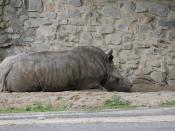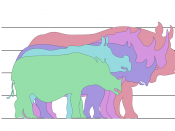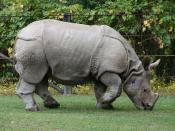Quote 1: "One must keep up with the times!" This quote seems pretty self-explanatory to me. It means that a person must change along with society. You must modernize not only the way you look and act, but also the way you think. With the change of time, so does people's thinking process. You don't want to be left behind, because you refuse to change, so you should adapt. In terms of the story it's talking about how everybody is turning into rhinoceros', so you too might want to become a rhino just to keep up with the times. By the end of the story the narrator is the only person who hasn't changed into a rhinoceros, because he resisted change.
Quote 2: "They're still a minority, however. The way things are going, that won't last long..." This quote means that a group, of anything basically because it doesn't specify, that is a minority of the population is growing rapidly.
This statement could be looked at like that, or on the other hand the minority could be becoming extinct. In terms of the story though, this refers to the fact that the amount of rhinoceros' is increasing hastily. The rhinoceros' started out as only one, but as time went by, people started catching on, and eventually everybody wanted to become one, everybody except the narrator. He held a strong stand throughout the whole story, until he was finally giving in, by saying how pale he was, and how nice the thick, greenish skin of the rhinoceros' was. The minority took, over and everybody did change with the times, whether this was a good thing was a different story.
Because the rhinos represented the Nazi's and obviously we know now that they are a bad organization, but back then people just wanted to be part of the group, so they too became Nazi's, or rhinos.
Question 2: This whole story was a metaphor for the times in World War II. The story shows how the Nazi's (Rhinoceros') slowly worked their way into overpowering everybody. At first they were looked on as outcasts, and hated by all of the people, but as the numbers slowly increased, society gave this group a second look. Many, many people became a part of the Nazi's, and those who didn't paid the ultimate price.
Question 3: The narrator was ultimately refusing to change. He held his ground throughout the whole story, and despised of the rhinos, until the end. The ostracism was too much for him, and he regretted not changing, because then it was too late. The narrator was stuck in his ways, and held his ground for most of the part.





